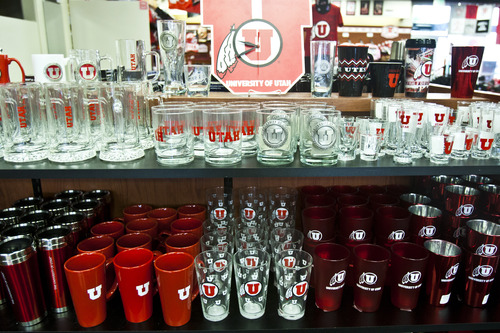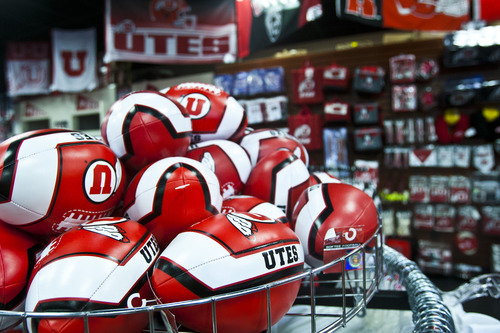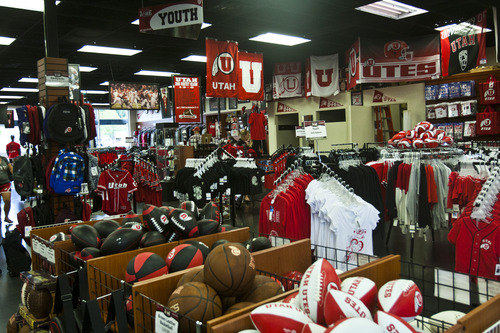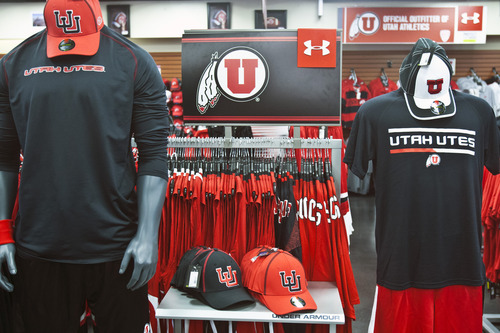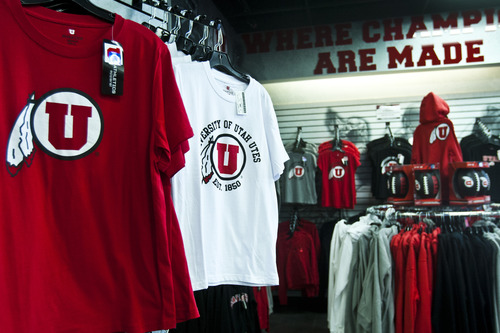This is an archived article that was published on sltrib.com in 2013, and information in the article may be outdated. It is provided only for personal research purposes and may not be reprinted.
A new legislative audit accuses the University of Utah of violating Board of Regents' and its own policies with Red Zone stores that compete with private businesses.
The stores, which began with a store in Sandy in 2010, followed by stores in Layton in 2011 and West Jordan in 2012, have sold $1.9 million worth of U. insignia merchandise such as sweatshirts and baseball caps, the audit says.
The Red Zone stores are the prime example, but other higher education business enterprises also increasingly encroach on the private sector, the audit found.
It pointed to Rice-Eccles Stadium, which hosts weddings, corporate meetings and high school dances, as well as the hotels and conference centers at both the U. and Utah State University in Logan.
Higher education institutions' businesses are supposed to serve their campus communities, but not advertise to or cultivate a public clientele.
The audit, released Monday by the Office of the Legislative Auditor General, recommends the Legislature consider passing a law about competition and that the Board of Regents provide greater oversight and enforcement of any updated policy.
"Unlike some other states, Utah statute does not address higher education competition with the private sector," said the summary of the audit performed by Richard Coleman, David Gibson and Derek Olson.
"While the Board of Regents has a policy on competition, we believe it is outdated and unenforced."
The audit also recommends the Legislature clarify which merchandise — beyond textbooks — should be taxed in university and college bookstores, as the practices vary widely.
Weber State University, for instance, does not charge sales tax on computers, and the Utah Tax Commission agrees that's a reasonable interpretation of state law.
The current law is too general, and Utah tax coffers may be suffering as a result, the audit suggests.
The audit poured cold water on a complaint by an Ogden area business that WSU is selling Apple computers to the public at a student discount. Auditors tried, but failed, to buy an Apple without student or faculty identification at five institutions, including WSU, the audit says.
In written responses to the audit, vice presidents from the U. and USU as well as Dave Buhler, commissioner of higher education, agreed that Regents' policies should be updated and clarified.
Buhler warned of "the law of unintended consequences" in any fix.
It was less than two years ago that another legislative audit suggested institutions use revenue-generating activities to contribute more money to operations and maintenance, he noted.
"The pressure for institutions to constantly be on the lookout for additional revenue streams can at times appear to conflict with the mandate that they clearly stay away from any activities that can be perceived as competing directly with private businesses," Buhler wrote.
Arnold Combe, U. vice president, denied the U. has violated any policies, and defended the Red Zone stores as serving the university's growing fan base, particularly after the U. joined the Pac-12. He cautioned that "undue restrictions" could place greater financial burdens on students and their families.
Neither the state nor students subsidize the campus bookstore and its Red Zone stores, and sales of insignia merchandise help it remain self-supporting in a time of lower textbook sales, he wrote.
Membership in the Pac-12 increased demand for insignia merchandise considerably, and there were increasing complaints that the campus bookstore was inconvenient. "Private retailers offered a limited and only seasonal selection of Utah insignia apparel and merchandise and didn't come close to meeting the need," Combe wrote.
While the audit dings the U. for not seeking approval of the Regents before opening the stores, Combe wrote that the U. Board of Trustees did approve.
He noted that other Pac-12 universities — Arizona, Oregon, UCLA, USC and Washington — have stores similar to Utah's Red Zones, including in states that restrict competition with the private sector.
Twitter: @KristenMoulton —
About the audit
The Legislative Auditor General says businesses run by Utah's higher education institutions increasingly encroach on the private sector. Among a new audit's recommendations:
The Legislature should consider passing a law to spell out that such competition is not allowed.
The Board of Regents should update its policy and provide greater oversight and enforcement.
The Legislature should consider clarifying sales tax policy related to sales by higher education institutions.
The Board of Regents should give guidance on what are educationally related materials — and thus tax-free — and what are unrelated business activities.


